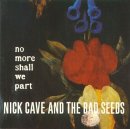 |
NICK CAVE AND THE BAD SEEDS
NO MORE SHALL WE PART
ALBUM MUTE, PLAYGROUND RELEASE:
APRIL 2, 2001 REVIEW: MARCH 31, 2001
 |
Somebody is happy again. Four years ago, he was heart broken, rejected and crouching on the steps of the Brompton Oratory, "forlorn and exhausted, baby, by the absence of you". A sad and lonely piano wept silently for the doubts and weaknesses of its player.
Nick Cave is now remarried and a father of four. Another kind of bittersweetness has emerged, a sort of ambivalent calm found in this new stable, quiet life. The love songs are no longer desperate, but seemingly at peace with their subject. They are almost painfully beautiful.
Still, the piano has kept its place, "crouched in the corner of my room with all it's teeth bared". Happiness hasn't stopped pressure, loneliness or doubts from surfacing, and sometimes desperation wells up. Now and then, as in "Oh My Lord", he takes an aimless walk away from it all as paranoia and fear overcomes him. The piano is subdued in an outburst of angry, brutal guitars smothering all hope in infernal noise.
So, Nick Cave again seeks refuge in God, at "The Gates of the Garden" of the Cathedral.
Sorry for my imagination running amok like that. It's just that biographical knowledge about Nick Cave really enhances his recordings and fits them into a fascinating, continuing tale of love, death, joy and sorrow. What? Me obsessed?
Anyway, "No More Shall We Part" is a more diverse and less conceptual album than its predecessor. To be sure, ballads in the vein of "The Boatman's Call" are here, but so are narrative, haunted pieces like "Fifteen Feet of Pure White Snow". And "God Is in the House" is written with the same touch of wry irony as the majority of the "Murder Ballads" album.
Most songs have sisters Kate and Anna McGarrigle singing backing vocals, which makes comparisons between the music of Cave and Leonard Cohen even more suitable. The rest of the band is more competent, although perhaps a bit less adventurous, than ever. Particularly Warren Ellis's (of The Dirty Three) violin effectively supports Cave's piano in painting the songs blue.
This record does not quite carry the punch of, say, "Let Love In" from 1994, lacking its delirious aggression, but it's a welcome return to the Bad Seeds I remember from before Nick Cave turned into the King of duets and closing time slow songs. In a comparison to other singer/songwriters, of course, this review really means great, terrific, outstanding, top of the hill. You just gotta go rougher on somebody who has consistently been raising his standards since 1980.
MATTIAS HUSS
|

 |